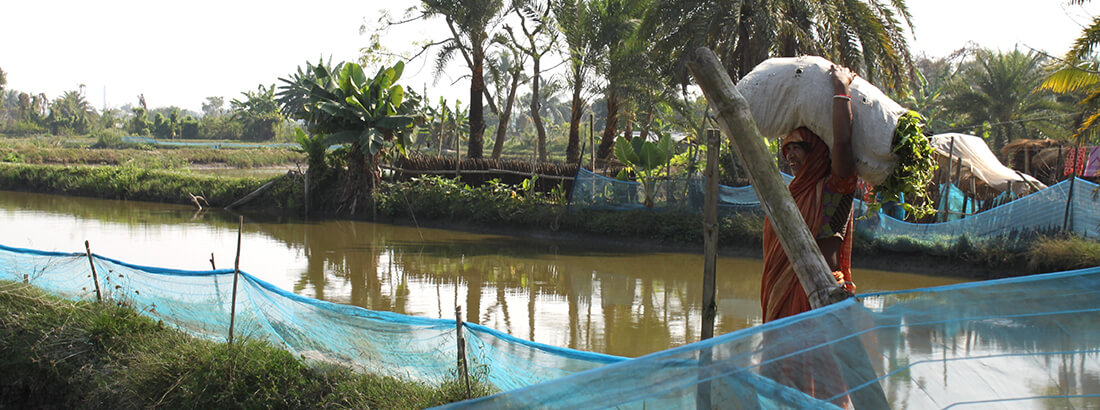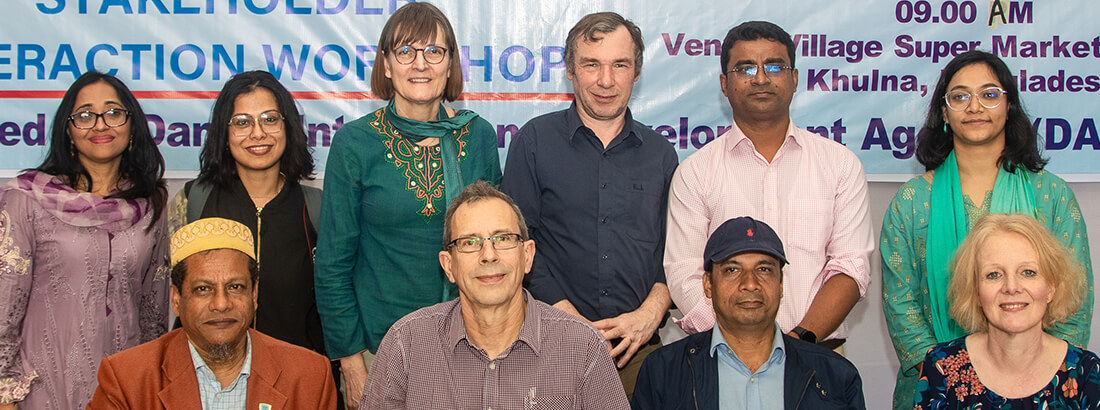Two scholarships under WPs 3 & 4 at the Noakhali Science and Technology University.
AQUAFOOD
Climate-resilient aquatic food systems for healthy lives of young women and girls in Bangladesh

The AQUAFOOD project is inviting applications for a total of 4 PhD scholarships.
The overall aim of this project is to generate new knowledge about the complex dynamics behind the export-driven aquatic food systems, across the coast-to-inland gradient of Bangladesh, in the context of the high climate change exposure.
- To establish an integrated framework for pathways that a) promote practices, which b) enhance the climate-resilience of c) the complex dynamics behind the export-driven, aquatic food systems of coast-to-inland ecosystems of Bangladesh.
- To investigate the impacts of climate change on the domestic supply’s farm-to-fork supply chains (from export-driven aquatic production systems), to understand their significance for domestic consumption, along with the environmental impact.
- To investigate the links between aquatic foods, and the health, nutrition and welfare of young women in coast-to-inland aquaculture dependent communities.
- To advance the research-based assessment tools of 1) aquatic food consumption using novel tools and biological markers, and 2) aquatic food production and supply chains for domestic consumption, using novel survey designs and mapping tools.
- To establish a stakeholder platform of private and public actors for continued interaction and feedback, along with sourcing of the research results.
- To support research capacity in inter-disciplinary research designs and within relevant scientific fields.
Fish and other aquatic foods are well recognized as an important source of high-quality protein, as well as an important dietary source of micronutrients. In Bangladesh, fish is a fundamental component in diets, consumed frequently - often daily or several times per week in peak seasons of high availability. However, the portions consumed are small and often insufficient to provide adequate amounts of key nutrients. Additionally, high population density and climate change, leading to raising sea level and a changing river hydrology, leave the population vulnerable to food insecurity and malnutrition.
Children and women are particularly vulnerable to nutritional deficiencies due to increased micronutrient requirements relative to energy intake. Adolescents and young women in Bangladesh are particularly at risk due to poverty, tendencies of disfavoring when it comes to food allocation, combined with early marriage and teenage pregnancy. Our previous research in non-married adolescent girls found omega-3 fatty acid status (DHA and EPA in their blood, an indicator for health and aquatic food intake) correlated with an applied measure for degree of female autonomy.
Bangladesh is one of the most vulnerable nations to the impacts of global climate change. The poor living in the coastal aquaculture farming communities is directly at risk of natural disasters; a risk only enhanced by the impacts of climate change. The importance of the export-driven aquaculture in coastal zone and the vulnerability of livelihoods for those living there are particularly crucial given the geography being highly impacted by the consequences of climate change. While Bangladesh has developed climate change specific policies, such as forecasts and preparedness for extreme weather events, climate change still needs to be better integrated and linked into both practical implementation and decisions on local levels across sectors, particularly in the highly exposed coastal communities. In this project, we will contribute new knowledge to fill this gap.
Export-driven aquaculture in context of climate change - an integrated survey
The integrated survey investigating aquatic production systems will integrate multiple methodologies. Overall, a combination of 1) a longitudinal household survey based on multi-level sampling, 2) the application of Geographic Information System (GIS), longitudinal market survey and Life-cycle assessment (LCA) together will form the basis of the investigation. These will provide a novel insight into spatial and temporal dynamics of the aquaculture system’s influence on livelihood, health and nutrition, in context of climate change.
Health and nutrition of young females in context of climate change - cohort study
This research builds on revisiting young women assessed in our previous research in 2017-2018, at that time adolescent girls aged 12-16 years. We hold data from a bi-seasonal survey of 300 adolescent girls, investigating multiple correlations of nutritional status, including aquatic food consumption and female autonomy. We found a positive correlation between blood omega-3 fatty acids as indicator of aquatic intake and a score for self-reported individual autonomy of adolescent girls. This data is a unique opportunity to investigate correlations between perception and adaption to climate change, and associations with health and well-being of the now young women.
Advancing assessment methodology for aquatic food consumption and health
This will cover the advancing of dietary registration of aquatic foods in Bangladesh by the development of a tailored, digitalized tool incorporating the site-specific species diversity. digitalized photo-based assessment tool will be developed. Nutritional composition of aquatic foods will be drawn from a new aquatic food composition database. The research component covers the design and validation. The technical app development will be outsourced to a commercial app developer. The aim is to reach a beta-version and to pilot the tool in cohort study, for further validate in an integrated survey.
Additionally, the following biomarkers will be investigated for the predictive value of aquatic food consumption, on individual or population level, as well as for associations with health and nutrition status. The assessment will be integrated in the study designs of integrated survey and cohort study. Blood fatty acids: Aquatic foods are unique sources of the long-chained omega-3 fatty acids ecosapentaenoic (EPA) and docosahexaenoic acids (DHA), and the blood concentration of EPA and DHA reflects aquatic food intake. Additionally, aquatic foods are also a source of vitamin D, and indicatively associates with fish consumption. In addition to blood markers, exploration of isotopes in hair samples as marker for aquatic food intake will be piloted, and to further explore the use of this technique as a non-invasive indicator of DHA and EPA intakes.
AQUAFOOD is a collaboration between project partners in Denmark, Bangladesh and United Kingdom.
Denmark
Bangladesh
Bangladesh Agriculture University
Noakhali Science and Technology University
United Kingdom
Involved in the project

Front row from left to right: M. A. Salam, David C Little, Mohammad Mahfujul Haque, Baukje de Roos.
Back row from left to right: Gulshan Ara, Navodita Malla, Nanna Roos, Richard Newton, Abdullah-Al Mamun, Samira D. Ali.
Internal
| Name | Title | Phone | |
|---|---|---|---|
| Nanna Roos | Associate Professor | +4535332497 | |
| Navodita Malla | Postdoc | +4535326525 |
External
Dr. Mohammad Mahfujul Haque, Professor, Department of Aquaculture, Bangladesh Agricultural University
Dr. Md. Abdus Salam, Professor, Department of Aquaculture, Bangladesh Agricultural University
Dr. Abdullah-Al Mamun, Professor, Department of Fisheries and Marine Science, Noakhali Science and Technology University
Dr. Tahmeed Ahmed, Executive Director, ICDDR,B
Dr. David C. Little, Professor, Aquatic Resource Development, University of Stirling
Dr. Richard Newton, Lecturer in Resilient Food Systems, Institute of Aquaculture, University of Stirling
Dr. Baukje de Roos, Professor, The Rowett Institute, University of Aberdeen
Funded by
 Ministry of Foreign Affairs of Denmark (MFA), administered by Danida Fellowship Centre.
Ministry of Foreign Affairs of Denmark (MFA), administered by Danida Fellowship Centre.
Period: 1 October 2023 - 31 March 2028 (54 months)
